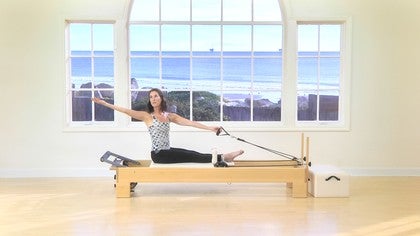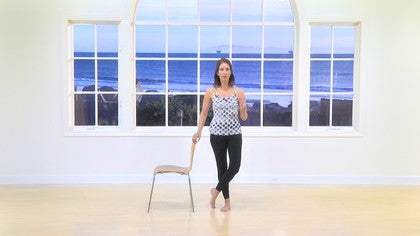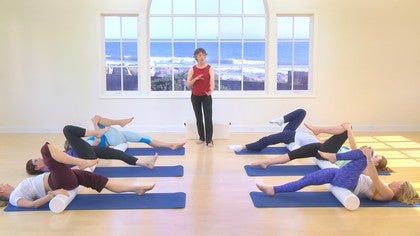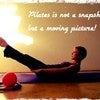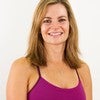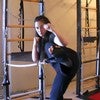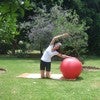Description
About This Video
Transcript
Read Full Transcript
Here are 10 moves I think you should do every day.
Standing On One Leg
First move is easy. You can do it any time during the day. And that is to stand on one leg. You can brush your teeth while you're standing on one leg. You can be talking on the phone standing on one leg. I don't know, you could try cooking with standing on one leg. It's a little difficult. You have to move, but it'd be more challenging for your leg. So standing on one leg whenever you can. Take your time. Also, checking your pelvis. If you're standing on one leg and you're sitting into the hip, we're not quite getting the strength that we're trying to develop in the leg. So check your pelvis. Make sure it's level.
And here's one little standing on one leg exercise you can do if you have a physio ball. You can place it against the wall. Lean your hip into the wall. And we're going to stand on one leg. So you lift the leg that's closest to the wall. And you can cross your hands. You can have your hands behind your head. And we can just hold it. Or you can also roll your hip down the wall and lift up the wall, and down the wall, and lift up. And you can just repeat about 10 times. And guess what? We're working this hip here, getting some oblique action. Doesn't have to be big. Nice, small movement. And then you can just stand and hold. So throughout the day, think about standing on one leg. It's very helpful.
Squat
Movement number two you should do every day is a squat of some sort. So you can keep your heels down and do a full squat to the floor. If that's not possible, for many reasons, you could use a chair or a door jamb to hold onto. Now, this chair is not very weighted. So if you need support, make sure you have enough weight on your chair. And you can hold the chair to help you come up. And I would try to do about 5 to 10 squats, fully and deeply, every day, even if it's just 5. And then, if you find out throughout the day, get out of your chair, and just sit in a squat. And talk to people on the phone. We seem to be on the phone a lot. So this is a good place to do it. Get out of your desk, sit in a squat.
Quadruped
OK, number three, we're going to come onto a quadruped position. Quadruped position is on the hands and knees. Now, a nice way to get down is by squatting. Hands and knees. So in this position, you try to find a long spine. And what I'd like you to try to do is only un-weight one hand and one knee, without changing any parts of your shoulders or your pelvis. Don't tip. And hold. It might look easy and simple, but it's not. We tend to want to tip or drop the shoulder. So see if you can maintain a nice, square position through the torso, and just un-weight one hand and one knee. Again, very simple. And then you can add the curl of the pelvis, which I think many people are familiar with, and tail up and chest, just look up. Doesn't have to be big. Just curl your spine. Look at your navel, tail goes up, and look to the ceiling, center. So quadruped.
Sphinx Position
Number four is what I call a sphinx position. So you'd lie on your stomach. And just being in this position on your elbows, with your pelvis on the floor, and just resting in this position. You don't have to do anything. Just be right here. If that's too much on your back, you can bring your body down and just start to look up. We think of infants and babies start their first movement. They lie on their stomach, and they start to lift their head up. And that's what you can be doing. And hopefully, you have the ability to come up onto your elbows. And just be in this position and breathe, just for a minute. It's very good for your back.
Seated Twist
Following that, another one is just to do a seated twist. So you can sit on the floor if you're on the floor or in a chair. But I'd prefer you be on the floor. And then just simply reach across the opposite knee, and look over your left shoulder. And just let everything move. You can move your chest, your navel, your hip. And just look behind you. Ooh, that beautiful view out there. And so you're twisting. Don't push it. Don't try to crank yourself. But just keep looking behind you. And you could just repeat that three or four times. Twisting's easy to do in a chair. If you happen to be at your office and you're not going to sit on the floor, just do it in the chair and twist. But getting spinal twists, especially in the upper back, is an important movement you should do every day.
Windshield Wiper
All right, so this one I call the windshield wiper. It's very easy. You just get to sit back, kind of slouch, nothing particular. Legs are a comfortable width, wherever you want. And you bend one knee. And what you're going to do is just actually clean the floor. If you want, you can put a little rag under your leg and start cleaning the floor. All right, so you're going to try to come all the way across. Now, what I'm trying not to do is turn my body. That's not giving me the hip action. You keep the pelvis forward. And we're just sliding the knee. Now, look at my knee. It's straight up here. Don't turn out or turn in. And what's nice about this is we're getting a stretch through here, contracting here, and all lateral tight hip, and just doing a little windshield wiping with both legs. And you can do it fairly quickly, nothing special. Just keep it in the hip. This is excellent to keep your hips strong and flexible. And it doesn't take that long.
Bridging
The next one is bridging. I believe everyone should do a bridge every day, even if it's, like, two bridges or three to the max. So I do have to take this out. So you just lie down with your knees bent, and you just press your pelvis up. It's very simple. You don't have to do anything special. Just kind of get that pelvis up. I like to reach my knees over the toes. And then you can just sit down. You can articulate more, if you'd like, to kind of give a little rolling to it. But you don't have to. The important thing is for the posterior hip, your butt, to push up, stretch open the front, feel the legs, feel your feet, and come down. If you only did three bridges every day, you would see a real benefit from that.
Hip Extension
And then, on a chair, what I like to do is a hip extension. And again, opening the front of the hips. We do so much sitting that we need to do more hip motion. OK, so I'm going to sit here, on the edge of the chair. You can hold your chair here. Bring this leg down, whatever's comfortable for you. Slide your foot back. No arch in the back. Try to stay upright. And just reach your knee towards the floor. Pelvis is level. You can add a little side stretch if you'd like. That always feels good. Reach back with the leg. And just hold for a count of 10. And then come out. Then you can do the other side. Again, if you're stuck in a chair all day, it's a great way to do a counter pose to open up the front of that hip. You can reach through your leg, reach the arm up, and do a nice stretch. And you'll feel most it in the front of the thigh here.
Shoulder Circles and Swings
Good. OK, shoulders. Next area, shoulders. What we want to be able to do is do some simple movements for shoulders. So I just suggest easy circles. You can just swing. You know how little kids used to just bend and swing the arm. Just let it rotate. We're going outward, if you notice. I'm not going to swing this way. This coming forward is too much. We're already too rounded. So just swing your arm. Be like a kid. Just swing, like you're running. You can pump. Now, if that's too much for your shoulder, if you're really tight, you can just do it out here. Swing your arm out here. It doesn't have to go up so high. Just kind of swing. Swing your arm to the other side. So we're just swinging. Just try to open up the shoulder. All these fibers drops. So we want to roll them up this way and your range through here.
So if you happen to see in a playground a crossbar that you can hang from, hanging is really a wonderful movement you can do. You may not be able to do that every day. But if you had a chin-up bar in your house, you could hang. But any opportunity you see a bar, take advantage of it and just hang. So I found this beam here. So I'm going to grab a hold of it. I'm going to keep my weight here, and I'm just going to hang. And what's happening is my body weight is dropping down, my spine is lengthening, and I'm getting a wonderful, three-dimensional stretch or length. I don't know if stretch is the right word. And you can add a little twisting if you'd like, just to release the shoulders. And it's amazing, when you come out of it, how your neck feels afterwards. So hanging any time you can is also a wonderful movement.
Neck Exercises
The last move I suggest you do every day is to move your neck. So you take your hands, and just place them on the back of your head, the base of your head there. And bring your elbows in a little bit so you're comfortable in the shoulders. And what I'd like you to do is just to lean back and look up a little bit so your head is past your center point. So you're looking up. Head is back. So there's some gravity pulling on your head. And you're going to push the back of your head into your hands. And you're going to hold it. Two, three, four, five. And then stop pushing, and just bring your head back to more of a center position. And then lift and look back so your head is behind your center. And you're going to push into your hands. And you count-- keep breathing-- one, two, three, four, five. And then relax, and bring your head. You could repeat that 10 times, even.
I'm going to do a little variation, though, because sometimes one side of your neck is a little tighter than the other. So what you're going to do is push more-- I'm pushing more on my right side so the right back of my head is pushing back. So I feel the right side of my neck in the back contracting. And I'm holding for the five and then relaxing. I can push on the left side so the left back of my head is pushing into my hands and holding for five. And then relax, and then come out. And you can release the arms. And it's amazing. Your neck is just like it's floating. So doing little neck isometrics like that is wonderful, especially if you've been working all day like this. It actually helps bring the tone back into your neck.
Mindful Movement: Stress-Relief Classes
Comments
By the way: love your top!!
You need to be a subscriber to post a comment.
Please Log In or Create an Account to start your free trial.
